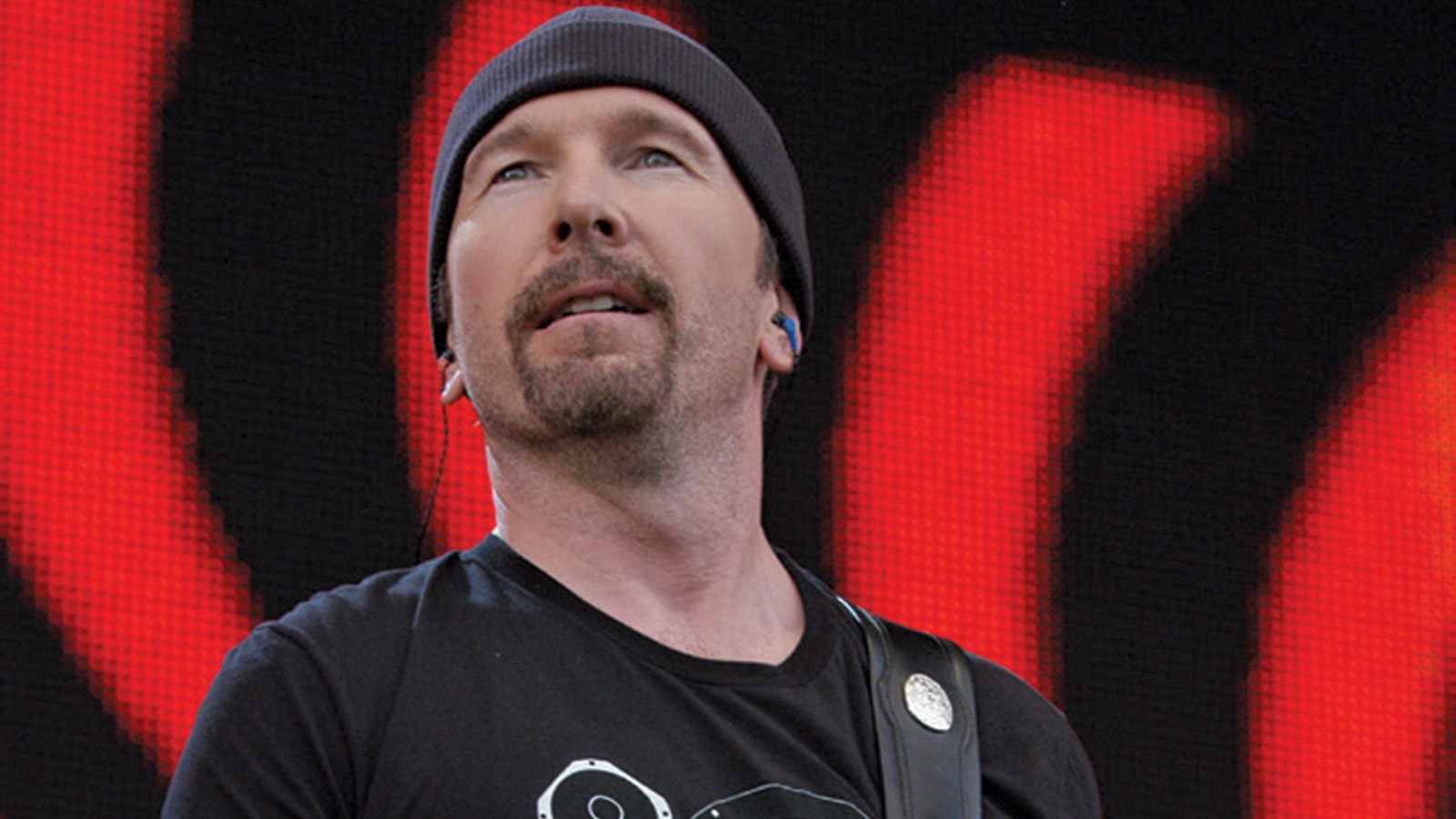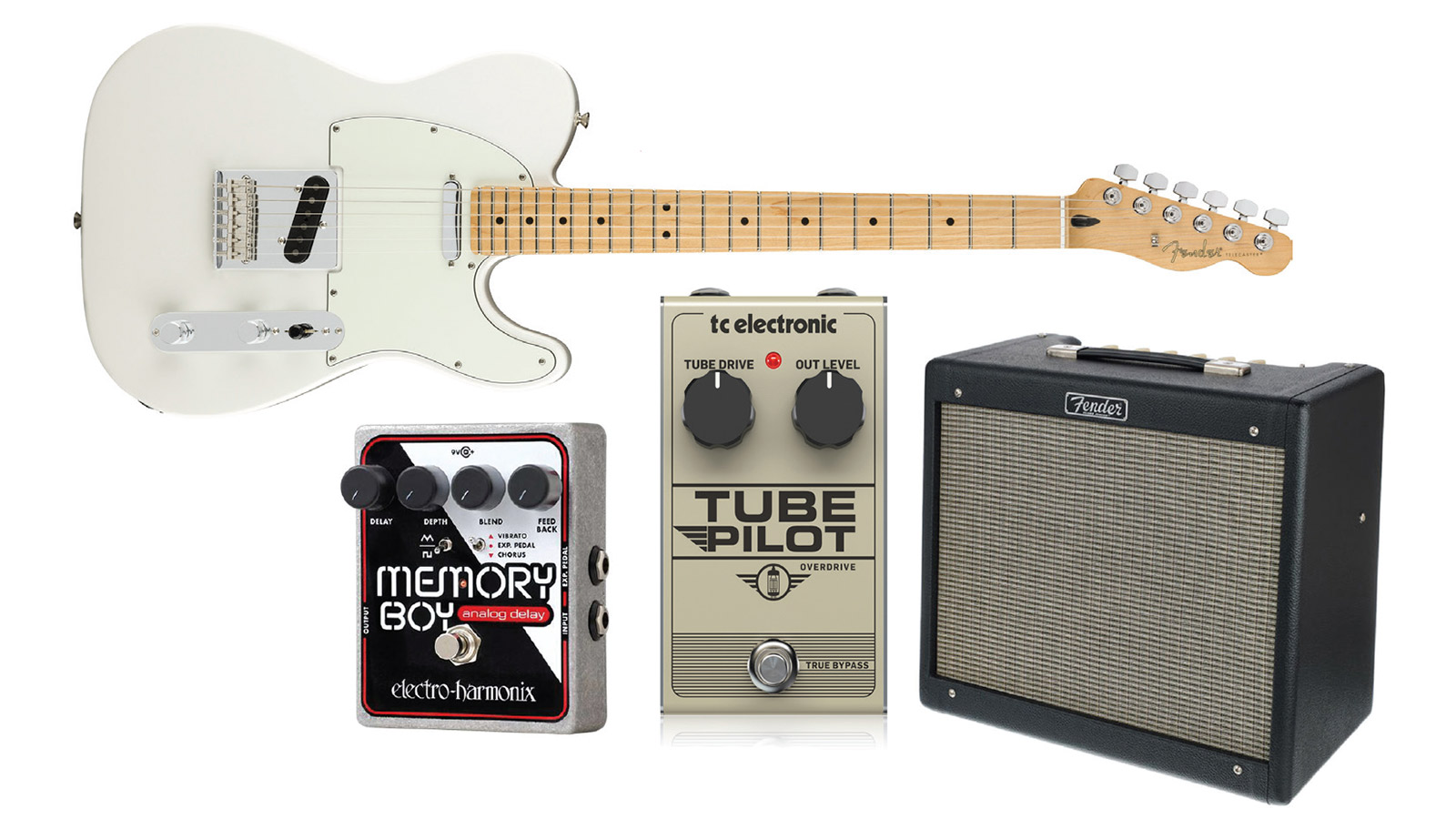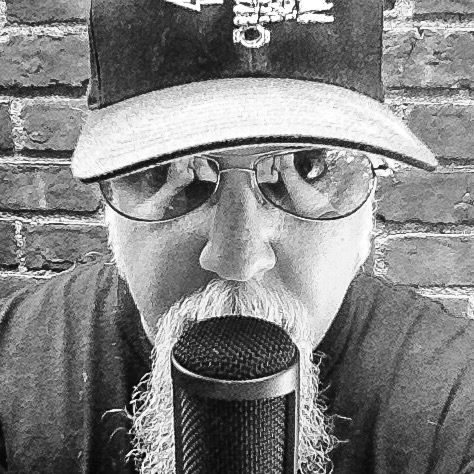The Secrets Behind The Edge's Guitar Tone on U2's "Vertigo"
Learn how The Edge got his monster tone on U2's 2004 smash hit.

Considering that U2 guitarist the Edge has been a bona fide tone geek for decades, it’s surprising that he didn’t discover the tweed Fender Deluxe amp until rather late in his career — 2004, to be exact; after his guitar tech Dallas Schoo bought him a 1957 Deluxe with the 5E3 circuit — when the Edge asked for a small amp that he could play at home and use to record demos. However, when the Edge acquired his first tweed Deluxe, he immediately put it to very good use — the amp inspired him to write the main riff for the song “Vertigo,” only 20 minutes after he first plugged into it.
According to Schoo, the Edge used only four pieces of gear in the studio when recording “Vertigo”: “a Line 6 DM4 stompbox, a vintage echo unit, a vintage Sixties Telecaster and a vintage Fender amplifier.” During a Guitar World interview he conducted in 2005, during U2’s “Vertigo” tour, the Edge revealed that the guitar in question was a 1966 Telecaster with a Lake Placid Blue finish, maple neck and Bigsby vibrato tailpiece. The “vintage echo” in question is undoubtedly the Korg SDD-3000 digital delay that has remained an essential element of the Edge’s signature clean tones since the mid Eighties.
The studio recording of “Vertigo” features two distinct guitar tones: raw, raunchy distortion for the main power-chord riff and a clean tone with long, ambient delays for accents and a mid-song instrumental break. The distortion’s delicious grind comes courtesy of the overdriven Deluxe, pushed even harder by the Line 6 DM4 Distortion Modeler in the pedal’s Tube Drive setting, which models a Chandler Tube Driver. The clean sound is classic Edge, with the Deluxe turned down just to the brink of overdrive and modulated delay providing depth and ambience. Even though the Edge tours with a massive rig that resembles NASA Mission Control, on this song — and as he’s often done throughout his career — he proves that less is truly more.

GET THE SOUND, CHEAP!
• Fender Player Telecaster
• Fender Blues Junior IV 1x12 combo
• TC Electronic Tube Pilot overdrive
• Electro-Harmonix Memory Boy analog delay
TONE TIP: Stacking overdrive tones from the amp itself and the pedal provides the ideal amount of grind, but be careful not to overdo either to retain definition and brightness. The Memory Boy may be analog (not digital), but its warmth and triangle wave modulation nail the vibe of classic Edge tone.
ORIGINAL GEAR
Get The Pick Newsletter
All the latest guitar news, interviews, lessons, reviews, deals and more, direct to your inbox!
GUITAR: 1966 Fender Telecaster with stock single-coil pickups (bridge); volume: 10, tone: 10
AMP: 1957 tweed Fender Deluxe 5E3 with one 12-inch Jensen alnico “blue cap” speaker (distortion tone – instrument input 1, instrument volume 10, tone 12; clean tone – instrument input 1, instrument volume 4.5, tone 12; Note: Controls on a tweed Fender Deluxe go from 1-12, so we’ve made an exception here to our usual 1-10 designations)
EFFECTS: Line 6 DM4 Distortion Modeler (Tube Drive setting, Drive: 8, Bass: 4, Mid: 7, Treble: 5, Volume: 7.5); Korg SDD-3000 (Delay Time: 440ms, Feedback: 3, Filter Low: 250Hz, Filter High: 4kHz, Modulation Waveform: Triangle, Intensity: 1.5, Frequency: 6, Level Balance: 5)
STRINGS/TUNING: D’Addario EXL110 Nickel Wound Regular Light .010- .046/Standard
PICK: Herdim Medium nylon
Chris is the co-author of Eruption - Conversations with Eddie Van Halen. He is a 40-year music industry veteran who started at Boardwalk Entertainment (Joan Jett, Night Ranger) and Roland US before becoming a guitar journalist in 1991. He has interviewed more than 600 artists, written more than 1,400 product reviews and contributed to Jeff Beck’s Beck 01: Hot Rods and Rock & Roll and Eric Clapton’s Six String Stories.
“Every tour was the best I could have done. It was only after that I would listen to more Grateful Dead and realize I hadn’t come close”: John Mayer and Bob Weir reflect on 10 years of Dead & Company – and why the Sphere forced them to reassess everything
“Last time we were here, in ’89, we played with Slash on this stage. I don't remember what we did...” Slash makes surprise appearance at former Hanoi Rocks singer Michael Monroe's show at the Whisky a Go Go




![John Mayer and Bob Weir [left] of Dead & Company photographed against a grey background. Mayer wears a blue overshirt and has his signature Silver Sky on his shoulder. Weir wears grey and a bolo tie.](https://cdn.mos.cms.futurecdn.net/C6niSAybzVCHoYcpJ8ZZgE.jpg)

![A black-and-white action shot of Sergeant Thunderhoof perform live: [from left] Mark Sayer, Dan Flitcroft, Jim Camp and Josh Gallop](https://cdn.mos.cms.futurecdn.net/am3UhJbsxAE239XRRZ8zC8.jpg)






